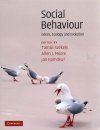About this book
Humans live in large and extensive societies and spend much of their time interacting socially. Likewise, most other animals also interact socially. Social behaviour is of constant fascination to biologists and psychologists of many disciplines, from behavioural ecology to comparative biology and sociobiology. The two major approaches used to study social behaviour involve either the mechanism of behaviour - where it has come from and how it has evolved, or the function of the behaviour studied.
With guest articles from leaders in the field, theoretical foundations along with recent advances are presented to give a truly multidisciplinary overview of social behaviour, for advanced undergraduate and graduate students. Topics include aggression, communication, group living, sexual behaviour and co-operative breeding. With examples ranging from bacteria to social mammals and humans, a variety of research tools are used, including candidate gene approaches, quantitative genetics, neuro-endocrine studies, cost-benefit and phylogenetic analyses and evolutionary game theory.
Contents
Introduction Tamas Szekely, Allen J. Moore and Jan Komdeur; Part I. Foundations: 1. Nature-nurture interactions Marla B. Sokolowski and Joel D. Levine; 2. The quantitative genetics of social behaviour Bronwyn H. Bleakley, Jason B. Wolf and Allen J. Moore; 3. Social behaviour and bird-song from a neural and endocrine perspective Elizabeth Adkins-Regan, Timothy J. DeVoogd and Jordan M. Moore; 4. Evolutionary game theory John M. McNamara and Franz J. Weissing; 5. Recent advances in comparative methods Robert P. Freckleton and Mark Pagel; 6. Social evolution theory: a review of methods and approaches Tom Wenseleers, Andy Gardner and Kevin R. Foster; Part II. Themes: 7. Aggression: towards an integration of gene, brain and behaviour Robert Huber and Edward A. Kravitz; 8. Social influences on communication signals: from honesty to exploitation Mark E. Hauber and Marlene Zuk; 9. Important topics in group living Jens Krause and Graeme Ruxton; 10. Sexual behaviour: conflict, cooperation and co-evolution Tomasso Pizzari and Russell Bonduriansky; 11. Pair bonds and parental behaviour Lisa McGraw, Tamas Szekely and Larry J. Young; 12. Adaptations and constraints in the evolution of delayed dispersal: implications for cooperation Jan Komdeur and Jan Ekman; 13. Social behaviour in microorganisms Kevin R. Foster; 14. Social environments, social tactics and their fitness consequences in complex mammalian societies Marion L. East and Heribert Hofer; 15. Social behaviour in humans Ruth Mace; Part III. Implications: 16. Personality and individual social specialisation Denis Reale and Niels J. Dingemanse; 17. Molecular and genetic influences on the neural substrate of social cognition in humans Louise Gallagher and David Skuse; 18. Population density, social behaviour and sex allocation Suzanne H. Alonzo and Ben C. Sheldon; 19. Social behaviour and speciation Gerald S. Wilkinson and Leanna M. Birge; 20. Social behaviour in conservation Daniel T. Blumstein; 21. Prospects for research in social behaviour: systems biology meets behaviour Allen J. Moore, Tamas Szekely and Jan Komdeur.
Customer Reviews
Biography
Tamas Szekely is an evolutionary biologist with a main research interest in breeding system evolution. Most of his work uses birds as model organisms studied mostly through fieldwork, although also with the use of mathematical modelling and phylogenetic analyses to dissect behaviour. He has co-edited four books, including one on sex, size and gender roles. He is a professional Chair in Biodiversity at the University of Bath and was recently awarded a Research Fellowship by The Leverhulme Trust, and was also a Visiting Fellow at Harvard University. Please see more details on his website http://www.bath.ac.uk/bio-sci/biodiversity-lab/szekely.html. Jan Komdeur has a strong reputation in experimental evolutionary ecology. He established the Seychelles warbler as a model system. He has many long-standing international collaborations with leading biologists which connect aspects of behavioural ecology, population genetics, and theoretical modelling. Komdeur has an excellent publication record, most papers being published in top journals of their field. His reputation is evidenced by memberships of editorial boards, frequent invitations for keynote lectures, prestigious (inter)national awards and grants, and several lecturer of the year awards. His group received the highest qualification ('international excellence') by an international peer review committee in the last assessment of research quality. Allen Moore is an evolutionary biologist, with research interests in behaviour genetics, quantitative genetic studies of behaviour and morphology, development of behaviour, theoretical investigations of evolution, and behavioural ecology. He is currently Professor of Evolutionary Genetics at the University of Exeter, as well as Head of Department and Director of the Centre for Ecology and Conservation, University of Exeter Cornwall Campus. He served as the elected Secretary of the Society for the Study of Evolution (2003-2006) and is currently the Editor-in-Chief of the Journal of Evolutionary Biology for the European Society for Evolutionary Biology.



































